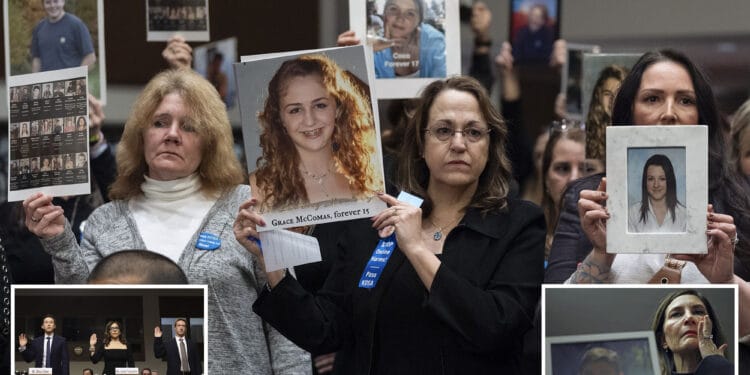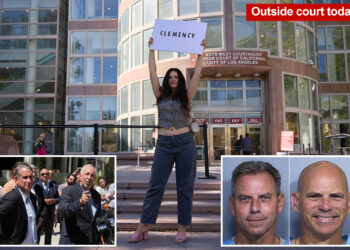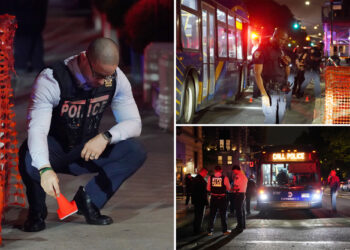
The mothers of three children whose lives were severely impacted due to the negligent effects of social media stared down the billionaire CEOs of the tech companies at an emotional Senate panel hearing on Wednesday.
Riley Basford and Grace McComas, both 15, were typical “goofy, silly” kids who had been attending church and starting a new job when things suddenly spiraled and took their own lives.
Mariam Fawzi was a high school athlete before being airlifted to a hospital due to severe anorexia after watching pro-eating disorder content on TikTok and Facebook.
“This is not going to stop, and more kids are gonna die and more kids are gonna get hurt,” said Mariam’s mother, Neveen Radwan, who’s made three trips to DC to lobby legislators to take more strenuous action.
Radwan and the mothers of Riley and Grace, whose lives were torn apart by online bullying and harassment, attended Wednesday’s Senate hearing, where the execs were grilled over their failure to protect kids on their platforms.
“Every time a group of parents comes out, different parents join us because more kids are dying,” Radwan said.
The parents have channeled their anguish into pushing for legislation aimed at putting an end to the abuse.
But the pace of progress on the issue — which has been described as a “crisis in America” by the panel’s Democratic chairman Sen. Dick Durbin — has been maddeningly slow.
“The longer this takes, the worse it’s going to be,” Radwan argued. “The numbers are going to keep growing because this is an ongoing problem.”
Meta CEO Mark Zuckerberg, TikTok CEO Shou Chew, X CEO Linda Yaccarino, Snap Inc. CEO Evan Spiegel, and Discord CEO Jason Citron were among the CEOs in attendance at the hearing.
As the executives entered the packed Senate Judiciary Committee Chamber, an audible hiss was heard from the crowd, which included many parents who held up photographs of their children who either died or had their lives upended, allegedly due to a lack of safety guardrails on social media platforms.
Neveen’s daughter Mariam had just started high school when the pandemic hit, which put a damper on the budding athlete’s training regimen.
With limited gym options available during the lockdown, Neveen said Mariam began searching social media for workout videos to help maintain her conditioning until school sports resumed.
However, the teen’s innocuous searches of fitness content would soon lead her down a treacherous path that nearly claimed her life.
Social media platforms utilize algorithms that adapt to a person’s interests, pushing videos and feeding them content that will keep them hooked on products.
Mariam was “bombarded” by suggestions for videos with disturbing premises such as “how to stay under 500 calories a day,” Neveen said.
“She kind of went into this black hole of eating disorder content that she never really asked for or looked for,” Neveen said. “But it became kind of her obsession.”
Within months, Mariam began experiencing heart problems. She spent the better part of a year in and out of hospitals, including being airlifted to a treatment center in Denver after suffering “multiple cardiac arrests” in 2021.
Although Mariam survived what Neveen called her “horrific journey,” she will be battling the urge to relapse for the rest of her life.
“I think what a lot of these companies don’t realize is that you don’t actually have to kill somebody to affect them for the rest of their lives,” Neveen points out. “These types of mental illnesses have triggers, and for her, absolutely her triggers were social media.”
Mary Rodee’s son Riley was a typical “goofy” teenage boy, who possessed the kind of charm that made teachers love him “even though he was so naughty in school.”
But Riley shot himself in 2021 after being targeted in a sexual extortion scheme by an overseas Facebook catfish who posed as an attractive girl and solicited him and several of his schoolmates with friend requests on the platform.
Mary said her late son was baited into exchanging sexually explicit images with the adult, who then immediately turned around and attempted to extort the teenager.
He took his own life shortly after Mary dropped him off at his father’s house, leaving behind 11 devastated siblings and step-siblings, including his younger sister who discovered his body.
“Four hours after I say goodbye to him, see you in a little while, with his cute little braces, talking about how next week he’s so excited for spring break, so many plans with his friends, he shoots himself because they scared him to death,” she said.
The teen had recently gotten a job and was determined to save enough money to buy a fixer-upper snowmobile on Facebook Marketplace, the platform’s answer to Craigslist.
However, when Riley and Mary answered honestly about his age while setting up an account, he was prohibited from using the marketplace, which restricts users under 18.
“It’s just the whole irony of the whole terrible situation,” she said of the platform’s security measures, which were capable of thwarting a teenager’s attempt at buying a snowmobile but not stopping criminal adults from exchanging sexually explicit materials with him.
Mary expressed fears that the public attention being paid to the teen victims would be short-lived and that the problem would only get worse without a serious and prolonged campaign aimed at fixing it.
“The American public has a very short attention span, and I’m only making it on the cover of these newspapers today,” she said. “This has to happen right now.”
The tragedy of children having their lives destroyed due to online bullying may have gotten increased attention in recent years, but the phenomenon isn’t new.
Christine McComas’ 15-year-old daughter Grace took her own life on Easter Sunday in 2012 after a lengthy cyberbullying campaign.
She described her daughter as “born happy,” and said the teen had been active in her community and church until a “drug-assisted sexual assault” when she was 14 turned her world upside-down.
After the assault, the teen was further victimized by a despicable cyberbullying campaign alleging she had “snitched” on those responsible.
Christine said her daughter began receiving horrible social media messages like “snitches should have their fingers cut off one by one while they watch their families burn” and “I hope you see this and cry yourself to sleep, and then wake up and kill yourself.”
She said the family turned to the school, the police and finally the courts — but received no help as they witnessed their daughter spiral.
“She was in crisis. We watched her, she had anxiety, she had depression. She’s finding it difficult to eat and sleep. It was like watching a slow-motion car crash,” Christine said.
“We got her mental health help, we surrounded her with as much love as we could, but she was scared. We live on three acres and she wouldn’t even go outside to walk to the mailbox.”
Less than a year after her death, the State of Maryland passed Grace’s Law, which criminalized the use of internet communications to harass or intimidate a minor.
Despite the progress made in her home state, Christine said continued public pressure on elected officials and social media heads is the only path to lasting change on a national level.
“As a parent who has lost my child so long ago at this point, it angers me a lot that nothing has been done in all of these years. And every time they decide not to do it, if they punt on it, or they don’t take action, I just know more kids will be harmed or killed,” she said.
“You can’t look away from grieving parents who want change. We’re all united not only in our grief but in our commitment that this shouldn’t happen to anybody else.”
If you are struggling with suicidal thoughts or are experiencing a mental health crisis and live in New York City, you can call 1-888-NYC-WELL for free and confidential crisis counseling. If you live outside the five boroughs, you can dial the 24/7 National Suicide Prevention hotline at 988 or go to SuicidePreventionLifeline.org.



























